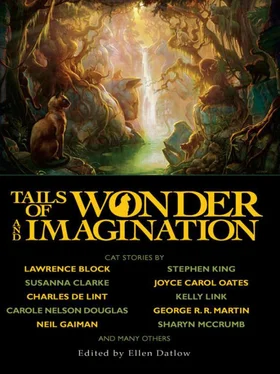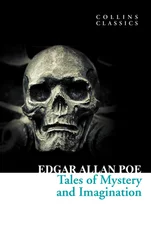Ellen Datlow - Tails of Wonder and Imagination
Здесь есть возможность читать онлайн «Ellen Datlow - Tails of Wonder and Imagination» весь текст электронной книги совершенно бесплатно (целиком полную версию без сокращений). В некоторых случаях можно слушать аудио, скачать через торрент в формате fb2 и присутствует краткое содержание. Год выпуска: 2010, ISBN: 2010, Издательство: Night Shade Books, Жанр: Фэнтези, Фантастика и фэнтези, Ужасы и Мистика, на английском языке. Описание произведения, (предисловие) а так же отзывы посетителей доступны на портале библиотеки ЛибКат.
- Название:Tails of Wonder and Imagination
- Автор:
- Издательство:Night Shade Books
- Жанр:
- Год:2010
- ISBN:978-1-59780-170-6
- Рейтинг книги:5 / 5. Голосов: 1
-
Избранное:Добавить в избранное
- Отзывы:
-
Ваша оценка:
- 100
- 1
- 2
- 3
- 4
- 5
Tails of Wonder and Imagination: краткое содержание, описание и аннотация
Предлагаем к чтению аннотацию, описание, краткое содержание или предисловие (зависит от того, что написал сам автор книги «Tails of Wonder and Imagination»). Если вы не нашли необходимую информацию о книге — напишите в комментариях, мы постараемся отыскать её.
collects the best of the last thirty years of science fiction and fantasy stories about cats from an all-star list of contributors.
Tails of Wonder and Imagination — читать онлайн бесплатно полную книгу (весь текст) целиком
Ниже представлен текст книги, разбитый по страницам. Система сохранения места последней прочитанной страницы, позволяет с удобством читать онлайн бесплатно книгу «Tails of Wonder and Imagination», без необходимости каждый раз заново искать на чём Вы остановились. Поставьте закладку, и сможете в любой момент перейти на страницу, на которой закончили чтение.
Интервал:
Закладка:
After that incident Mr. Muir seemed resigned to the knowledge that he would never have such an opportunity again. The end was swiftly approaching.
It happened quite suddenly, in the second week of November, that Alissa returned home.
She had quit the play; she had quit the “professional stage”; she did not even intend, as she told her husband vehemently, to visit New York City for a long time.
He saw to his astonishment that she’d been crying. Her eyes were unnaturally bright and seemed smaller than he recalled. And her prettiness looked worn, as if another face—harder, of smaller dimensions—were pushing through. Poor Alissa! She had gone away with such hope! When Mr. Muir moved to embrace her, however, meaning to comfort her, she drew away from him; her very nostrils pinched as if she found the smell of him offensive. “Please,” she said, not looking him in the eye. “I don’t feel well. What I want most is to be alone… just to be alone.”
She retired to her room, to her bed. For several days she remained sequestered there, admitting only one of the female servants and, of course, her beloved Miranda, when Miranda condescended to visit the house. (To his immense relief Mr. Muir observed that the white cat showed no sign of their recent struggle. His lacerated hands and face were slow to heal, but in her own grief and self-absorption, Alissa seemed not to have noticed.)
In her room, behind her locked door, Alissa made a number of telephone calls to New York City. Often she seemed to be weeping over the phone, but so far as Mr. Muir could determine—being forced, under these special circumstances, to eavesdrop on the line—none of her conversations were with Alban.
Which meant ? He had to confess he had no idea; nor could he ask Alissa. For that would give away the fact that he’d been eavesdropping, and she would be deeply shocked.
Mr. Muir sent small bouquets of autumn flowers to Alissa’s sickroom; bought her chocolates and bonbons, slender volumes of poetry, a new diamond bracelet. Several times he presented himself at her door, ever the eager suitor, but she explained that she was not prepared to see him just yet—not just yet. Her voice was shrill and edged with a metallic tone Mr. Muir had not heard before.
“Don’t you love me, Alissa?” he cried suddenly.
There was a moment’s embarrassed silence. Then: “Of course I do. But please go away and leave me alone.”
So worried was Mr. Muir about Alissa that he could no longer sleep for more than an hour or two at a time, and these hours were characterized by tumultuous dreams. The white cat! The hideous smothering weight! Fur in his very mouth! Yet awake he thought only of Alissa and of how, though she had come home to him, it was not in fact to him.
He lay alone in his solitary bed, amidst the tangled bedclothes, weeping hoarsely. One morning he stroked his chin and touched bristles: He’d neglected to shave for several days.
From his balcony he chanced to see the white cat preening atop the garden wall, a larger creature than he recalled. She had fully recovered from his attack. (If, indeed, she had been injured by it. If indeed, the cat on the garden wall was the selfsame cat that had blundered into his study.) Her white fur very nearly blazed in the sun; her eyes were miniature golden-glowing coals set deep in her skull. Mr. Muir felt a mild shock seeing her: What a beautiful creature!
Though in the next instant, of course, he realized what she was.
One rainy, gusty evening in late November Mr. Muir was driving on the narrow blacktop road above the river, Alissa silent at his side—stubbornly silent, he thought. She wore a black cashmere cloak and a hat of soft black felt that fitted her head tightly ., covering most of her hair. These were items of clothing Mr. Muir had not seen before, and in their stylish austerity they suggested the growing distance between them. When he had helped her into the car she’d murmured “thank you” in a tone that indicated “Oh! Must you touch me?” And Mr. Muir had made a mocking little bow, standing bare-headed in the rain.
And I had loved you so much.
Now she did not speak. Sat with her lovely profile turned from him. As if she were fascinated by the lashing rain, the river pocked and heaving below, the gusts of wind that rocked the English-built car as Mr. Muir pressed his foot ever harder on the gas pedal. “It will be better this way, my dear wife,” Mr. Muir said quietly. “Even if you love no other man, it is painfully clear that you do not love me.” At these solemn words A lissa started guiltily, but still would not face him. “My dear? Do you understand? It will be better this way—do not be frightened.” As Mr. Muir drove faster, as the car rocked more violently in the wind, Alissa pressed her hands against her mouth as if to stifle any protest; she was staring transfixed—as Mr. Muir stared transfixed at the rushing pavement.
Only when Mr. Muir bravely turned the car’s front wheels in the direction of a guardrail did her resolve break: she emitted a series of breathless little screams, shrinking back against the seat, but made no effort to seize his arm or the wheel. And in an instant all was over, in any case—the car crashed through the railing, seemed to spin in midair, dropped to the rock-strewn hillside and bursting into flame, turned end over end…
He was seated in a chair with wheels—a wheeled chair! It seemed to him a remarkable invention and he wondered whose ingenuity lay behind it.
Though he had not the capacity, being almost totally paralyzed, to propel it of his own volition.
And, being blind, he had no volition in any case! He was quite content to stay where he was, so long as it was out of the draft. (The invisible room in which he now resided was, for the most part, cozily heated—his wife had seen to that—but where yet remained unpredictable currents of cold air that assailed him from time to time. His bodily temperature, he feared, could not maintain its integrity against any sustained onslaught.)
He had forgotten the names for many things and felt no great grief. Indeed, not knowing names relaxes one’s desire for the things that, ghostlike, forever unattainable, dwell behind them. And of course his blindness had much to do with this—for which he was grateful! Quite grateful!
Blind, yet not wholly blind: for he could see (indeed, could not not see) washes of white, gradations of white, astonishing subtleties of white like rivulets in a stream perpetually breaking and filling about his head, not distinguished by any form or outline or vulgar suggestion of an object in space….
He had had, evidently, a number of operations. How many he did not know; nor did he care to know. In recent weeks they had spoken earnestly to him of the possibility of yet another operation on his brain, the (hypothetical) object being, if he understood correctly, the restoration of his ability to move some of the toes on his left foot. Had he the capacity to laugh he would have laughed, but perhaps his dignified silence was preferable.
Alissa’s sweet voice joined with the others in a chorus of bleak enthusiasm, but so far as he knew the operation had never taken place. Or if it had, it had not been a conspicuous success. The toes of his left foot were as remote and lost to him as all the other parts of his body.
“How lucky you were, Julius, that another car came along! Why, you might have died!”
It seemed that Julius Muir had been driving alone in a violent thunderstorm on the narrow River Road, high above the embankment; uncharacteristically, he’d been driving at a high speed; he’d lost control of his car, crashed through the inadequate guardrail, and over the side… “miraculously” thrown clear of the burning wreckage. Two-thirds of the bones in his slender body broken, skull severely fractured, spinal column smashed, a lung pierced… So the story of how Julius had come to this place, his final resting place, this place of milk-white peace, emerged, in fragments shattered and haphazard as those of a smashed windshield.
Читать дальшеИнтервал:
Закладка:
Похожие книги на «Tails of Wonder and Imagination»
Представляем Вашему вниманию похожие книги на «Tails of Wonder and Imagination» списком для выбора. Мы отобрали схожую по названию и смыслу литературу в надежде предоставить читателям больше вариантов отыскать новые, интересные, ещё непрочитанные произведения.
Обсуждение, отзывы о книге «Tails of Wonder and Imagination» и просто собственные мнения читателей. Оставьте ваши комментарии, напишите, что Вы думаете о произведении, его смысле или главных героях. Укажите что конкретно понравилось, а что нет, и почему Вы так считаете.












